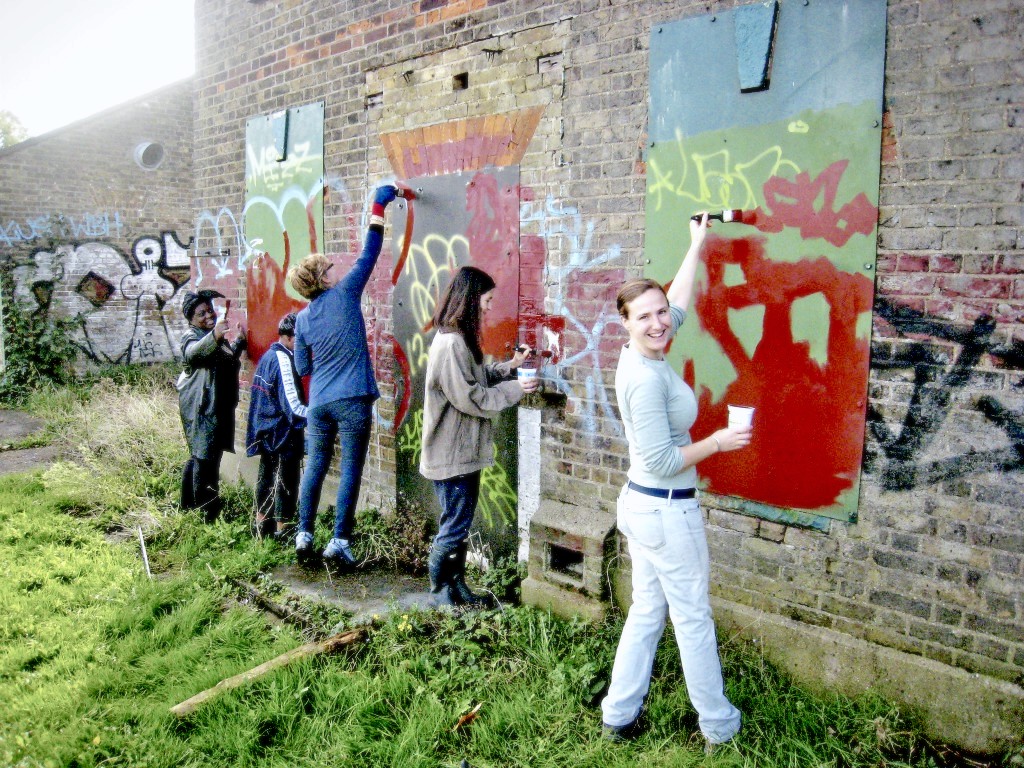All around the country, community organisations are rapidly adapting to the conditions of the coronavirus.
Far Nearer is tracking this activity with an interactive map and in conversation with community leaders on the front lines.
Click on the map to explore, or read the latest interviews below.
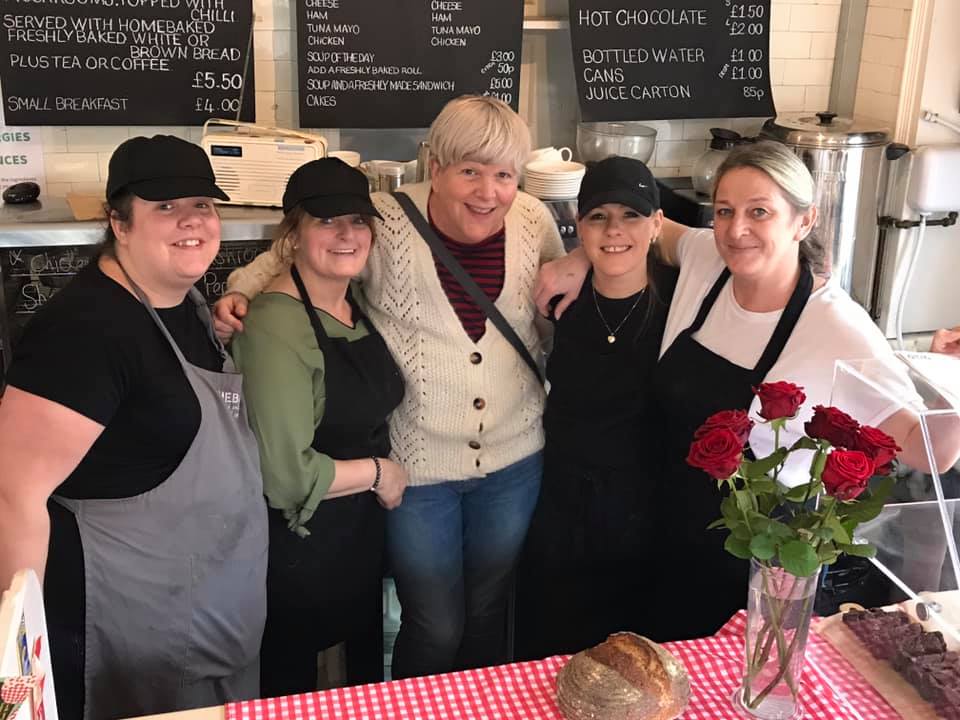
Sally-Anne Watkiss is treasurer of Homebaked, a community-run bakery opposite the Liverpool football stadium in Anfield. When did you notice things start to change? We knew the Madrid game would be the last game [on March 11]. Our income is 90 per cent from trading, and 40 per cent of that comes from the football, so straight away we knew we had to do something. In the short term we applied for grants from Steve Morgan, a local funder, to carry on baking bread to give away to food banks. We used to bake 40 loaves a bread a day, now we bake 100. Then we realised there was a massive demand for frozen pies delivered to homes, so we started making pies again, but 600 pies a week compared to 2,500. We are constrained by how quickly they can be delivered. They go on sale on a Thursday and they are selling out in five minutes. People have alarms in their phones to tell them when they are about to go on sale. We have 10 local vulnerable people on our distribution list – people who have fallen through the cracks. So they get a weekly pie delivered & a loaf (and a weekly breakfast) How are you managing financially? We have a team of 20 and 15 of those are currently furloughed. That reflects the scale of the loss on income. We’ve got from sales of upwards of £20,000 a month to probably £6,000 a month. Obviously we have lost the pies from the football and supplied to the executive box at the ground, but we also a supplied to several pubs (around the weekend ) and the cafe was open every day – all of that has stopped. We’ve also been caught up in the problem with the grant from rate relief as it is our landlord, not us, which is eligible for grant relief. Massive thanks to @HomebakedA for the donation of butter yesterday! 😘Our lovely neighbours absolutely loved your Scouse pies last week!😍#foodislove #stayhomesavelives #scouse pic.twitter.com/89HsEAJ6vb— Horse and Jockey Pub, Melling (@HorseJockeyMel) May 27, 2020 What should the government do? They need to extend the furlough scheme to recognise that businesses are going to be opening at different times. We are a bit of a hybrid because we are a business and we benefit from the business stuff the government has done, we’re also a social enterprise so we have access to funding from the Steve Morgan foundation and Power to Change. So we have some of the issues that trading businesses have and some of the issues that charities have, but we have a strong brand and a strong community, and because we are rooted in community, we are able to move fast. We were only closed for four or five days. If we head into another period of austerity, we’re all doomed. How has your relationship been with the council? We haven’t needed to contact the council in Anfield. The pie production plant is in Sefton and the environmental health team at Sefton Council was great at checking we were able to do frozen pie delivery. But the main support was our networks and people choosing to spend their grants with us. The L6 Centre is buying pies from us, the Florry have bought pies from us, we have probably had nearly £1000 from donations that we have used to send bread to the local hospital and pies to the fire stations and NHS teams around the city including the ambulance station in Alder Hey. We have also given pies to the volunteers at the food bank. So when you buy a pie, you can choose to donate a pie. What do you hope will change in the longer term? I’m hoping that it will change the food bank model to cash donations and short term help that is nutritious. I think it will help with the revitalisation of neighbourhood high streets and local supply chains. Our butcher is based in a neighbourhood high street and they are thriving through this because they can stay open and do distance selling but supply across the city. We have such a great partnership. Just asked @HomebakedA if they could make us 70 loaves for Thursday. No rude words 🤣 just “yes”. 😘 #feedingpeople #freshfood #buildbackbetter #lcrcares #thelids pic.twitter.com/1iU91H2m4E— KnowsleyKitchen (@KnowsleyKitchen) May 18, 2020 The issue will be how do you get it further back, getting local farmers and growers connect with food manufacturers and local people. We have gone part of the way there but the missing link is the growing. One of the things that Homebaked has found is that demand for our frozen pies won’t be as big. We know that if we can cook and chill pies rather than freeze them, then we have got a bigger market potential, so we’re looking at how we can invest in equipment to exploit that market. We’re really hoping that 100 loaves of bread a day will become the norm and food banks and community groups will continue to buy our bread. But if we head into another period of austerity, we’re all doomed. At the moment, the affluent areas of the city, and Liverpool supporters from around the country, have donated to us because they love Anfield. But if the whole country starts to feel the effects, the donations will dry up, and the need will be even greater.
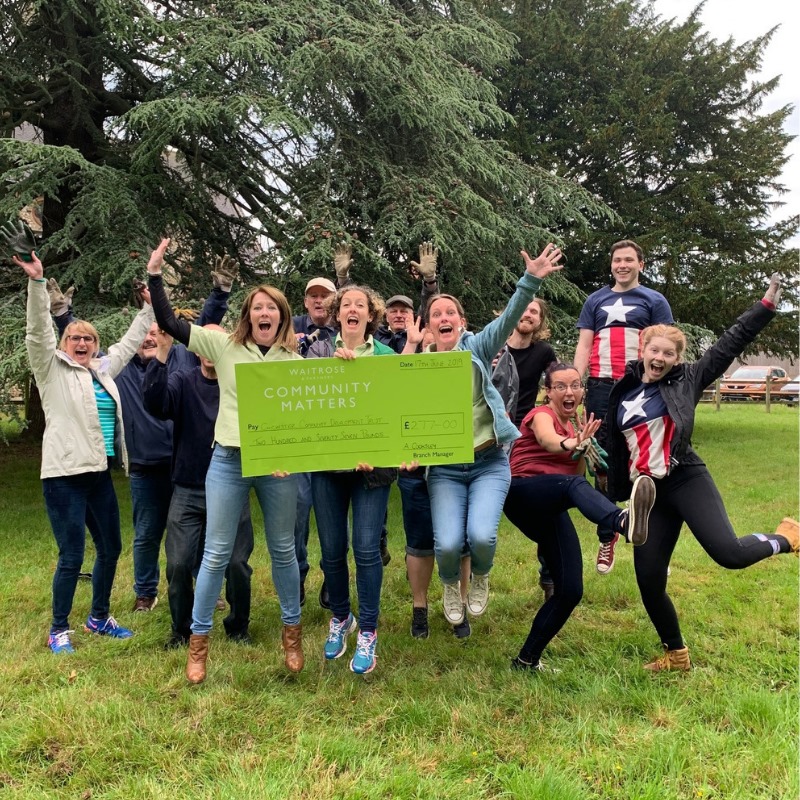
The Chichester Community Development Trust provides spaces for hire and community projects in a suite of community-run buildings in Graylingwell Park, Roussillon Park and Keepers Green in Chichester, West Sussex. It was set up when developer Linden Homes had a responsibility to provide community buildings during a 2014 development of the site, which included the provision of 750 new buildings and 64,000 sq ft of commercial space. The area had been earmarked for redevelopment after 2007, when the mental health hospital on the site finally closed down. The Chichester Development Trust has raised almost £2 million in mostly National Lottery Heritage Funding for the redevelopment of a chapel on the site of the old hospital. They are working with architects to turn it into a community space for reflection and relaxation, where people can meet, try new activities and learn more about the local heritage. A small cafe will be attached to the chapel, where the Trust will run live exhibitions to raise awareness of the pioneering mental health work carried out in the hospital’s 100-year history. When did things start to change? As soon as we sensed a lockdown could be coming to the UK, we were fortunate to work with printing partners to developed a flyer outlining ideas into how neighbours could support each other and for people to let us know if they needed any practical support, like collecting the bins and walking the dog, supermarket shopping or prescription collections. Need help with your technology questions? Join our Virtual IT café at 10-11am today & have a chat with our expert Derek. He’s here to give advice on staying connected with friends/family, working from home or ensuring vigilance with online security. https://t.co/Riq65R1H6J pic.twitter.com/tiR5st9gvw — Chichester CDT (@ChichesterCDT) May 15, 2020 Then we spoke to our local residents associations once lick down was kicking in, so people understood the extent of of the support available. There were quite a few areas where there wasn’t a volunteer service in north east Chichester, so following discussions with the District Council and local support groups we printed another run of leaflets and delivered them to those additional areas. We ended up flyering around 3,500 households, so they all knew how to get in touch with us by phone or email. Through that we gathered a wonderful group of 50 volunteers. The Little Learners nursery group that meets at the Lodge has been distributing packs with craft activities to do at home, so we can provide practical support for families that might be struggling with resources. How are you helping with food? People are sending us food orders. It was one of the early challenges. We don’t want any cash changing hands or people exchanging bank details, so we have been acting as an interim banking hub: people ask us for shopping, we pass that on to a volunteer, they deliver it directly observing social distancing, photograph the receipt and email it to us, then the person receiving the shopping can pay us online. We received an early grant as a slush fund to support that, so that repayments can be made when it is possible for those facing hardships, so we can ensure data protection. That can be a real challenge for pop-up volunteer groups. If there was widespread Click and Collect that would be fine, but Click and Collect is so hard to access at the moment. Obviously we go and collect foodbank deliveries as well. What other organisations are you working with? We’re in regular contact with the district council and the county council. They have been great. The feedback is that across the region there has been such incredible support that the help available outweighs the need, so people asking for support are getting it. The concern is for families that aren’t speaking out. But the wellbeing team is phoning round, so there is lots of proactive support as well. How has it affected you financially? Luckily we don’t depend on fundraising events and activities. But the closure of our community building has affected revenue as we invested the surplus from the hire into the community. Our director has been identifying grants and support. We have received the grant from the government that provides rates relief on each building. That has shored up what we are doing. Congratulations to Florence, winner of the CCT Photography Competition in the Under-16’s category. What a nice idea to capture the theme of Shadows & Reflection. CCDT will award her the prize, a £10 Amazon voucher. Stay tuned for the next theme in the competition! #CCDTchallenge pic.twitter.com/b8aSy6i83v — Chichester CDT (@ChichesterCDT) May 16, 2020 Is there more the government needs to do? In our case, we have received the support that we need. Has anything been challenging? We have switched to virtual community cafes to give people free support. But the people who came in person to the community cafe, often weren’t as tech savvy, so our greatest challenge is to reach out to them – that’s why we’re dropping off packages to Little Learners. We’re using email, but that’s still missing people out. We usually have a fish and chip quiz and we do that digitally. There are 40-odd people on that quiz. But certainly some members of the community not getting picked up so well. So we’re trying to look for ways to support them. The leaflets have been great, because they have reached people who would never have asked us for help. People feel that has been very accessible. We’ve also been able to run additional activities like online live yoga lessons, a quiz for young people, art-based workshops, interactive sessions for Dads and kids with Dad la Soul and virtual IT cafes where people can come for tech support. What about the longer term? We have been talking about how lots of it will carry on. For people that are vulnerable, this will go on for much longer, especially as public areas are more crowded. That volunteer support Read More…
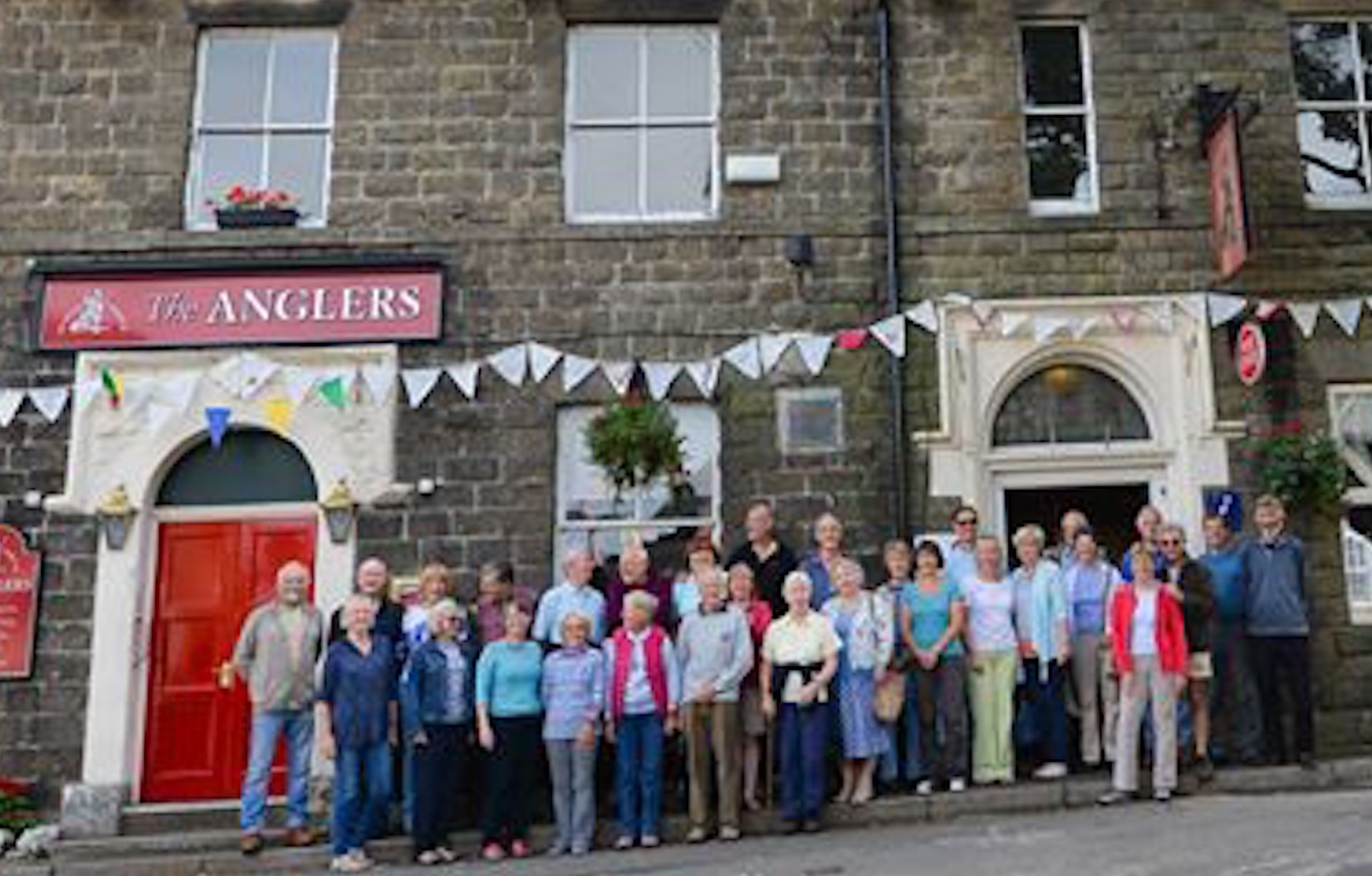
Jonathan Lindley is the chair of Bamford Community Society which runs the Anglers Rest, a pub in the middle of the village of Bamford in the Hope Valley of the Peak District, which was saved from a sale to developers in 2013 when residents launched a share offer and bought the premises for £280,000. The Anglers Rest now serves the community as a pub and meeting space with a snug for music and folk groups, a cafe in the daytime for tea and cake and a post office. Lindley says the Anglers Rest never made much money but “it was a going concern – and then we had corona”. When did things start to change? The pub was quite busy right until the government said you have to shut. We noticed people were cancelling their Mothering Sunday bookings. When we got the notice that we had to close, we closed the pub and cafe immediately. The post office was told to close, which was a blow because a lot of people draw their pensions out in cash. We sort of appealed – we wrote to them and said we’d like to stay open part time, and they agreed to two mornings a week as long as the pub was closed. We don’t offer a full service but people can buy a stamp, pay a utility bill, or draw a pension and withdraw cash. How did you manage financially? We furloughed the pub and cafe staff and realised we can’t afford to pay the post office staff when we are only open two days a week. The post office doesn’t really make any money anyway, but it’s a vital community service. It’s normally cross-subsidised by the other parts of the business, so we needed to find a way to keep it open without employing the post office manager. Two things happened. I wrote to the local MP to say that it was a bit of nonsense with the furloughing – because she is furloughed she is not allowed to do it voluntarily two days a week. They can’t have intended for a community facility to be shut – I was a civil servant for nearly 40 years, and I know that sometimes when policy is made quickly it’s not quite right when implemented: not everything is fully thought-through. The local MP wrote to the chancellor and we are awaiting the outcome. The second thing that we did, we asked the members if they would be prepared to have basic training to run the post office as a volunteer. At the same time, someone that used to work for us, who has been furloughed by her new employer, she has come along to volunteer for us. She is fully trained, she ran the post office for four years. And she is doing it voluntarily. It’s brilliant. It allows us to keep a community facility open for a steady flow of people. What other services are you offering? Using the Anglers Rest as a hub, we have an initiative called Helpful Bamford where a rota of nine people sit on the phone and people can ring to get shopping collected, prescriptions collected, veterinary medicines collected and have a friendly chat with someone. We use the Anglers Rest phone number so people know where to call. The legal entity is the Bamford Community Society, for anything we do financially in this Helpful Bamford initiative. For example, we got a grant from Foundation Derbyshire to do food parcels and they needed and bank account for that. Happy Mother’s Day. We are serving takeaway Sunday meals 12 – 4 pm We are here for help and assistance 01433 659317. pic.twitter.com/9aK5aO8GSJ — The Anglers Rest (@AnglersBamford) March 22, 2020 We approached the local cafes and businesses for perishable stock. We bought it from them and distributed it with the idea that some people would pay for it. One cafe had £400 of bread, cheese and eggs that we bought, bundled up and offered it to people in parcels of £15. Most have paid for it, so we can give that money back to the charitable bit of the council. But without that underwriting we wouldn’t have been able to do it. Yesterday someone wanted hayfever tablets, the pharmacy can’t take phone payments so whoever is collecting the tablets has to get them without paying because we don’t want volunteers to be touching cash. So we used the grant to set up a tab in the pharmacy so we can collect the medicine and the person receiving it can pay us back What’s next? There are all sorts of issues that arise from a lockdown being eased – I can’t see that people are going be coming in and standing next to one another at the bar, or sitting at tables eating for a while, the tables aren’t widely spaced. I can’t see that the older clientele of the cafe wanting to come back until there is a vaccine. So we’re starting to think about how to adapt our business model. We’re thinking about doing more on takeaways. Can we introduce more space in the dining bit of the pub by rearranging things? At the moment no-one knows what the future will look like. All of us feel that the pub will take quite a while to get back to normality. People will remember the places that helped them The chancellor must extend the furloughing if lockdown continues. For the hospitality trade that is essential. Because we’re the centre of the community, the most important thing for us is maintaining a place where people can say: “If I need help, I can go there.” This is altruistic, but it’s a good business proposition as well. People will remember the places that did that. Our strapline is: “More than a pub, a community hub,” and this crisis has given us the opportunity to demonstrate that.
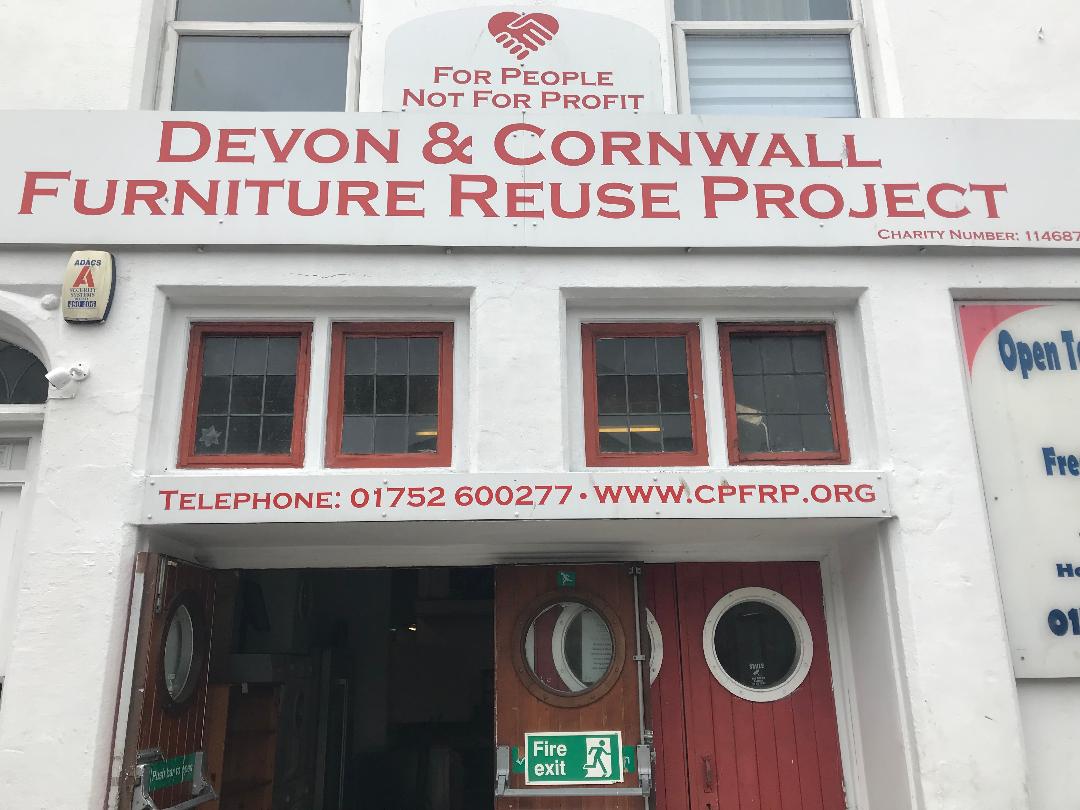
Alison Turner is chairperson at the Furniture Reuse Project, a charity that gives away furniture to people in need in Plymouth. Since March, she has had to close the shop and cancel furniture collection from home clearances – even though demand for furniture from homeless people in unfurnished accommodation and women fleeing domestic violence is higher than ever.

